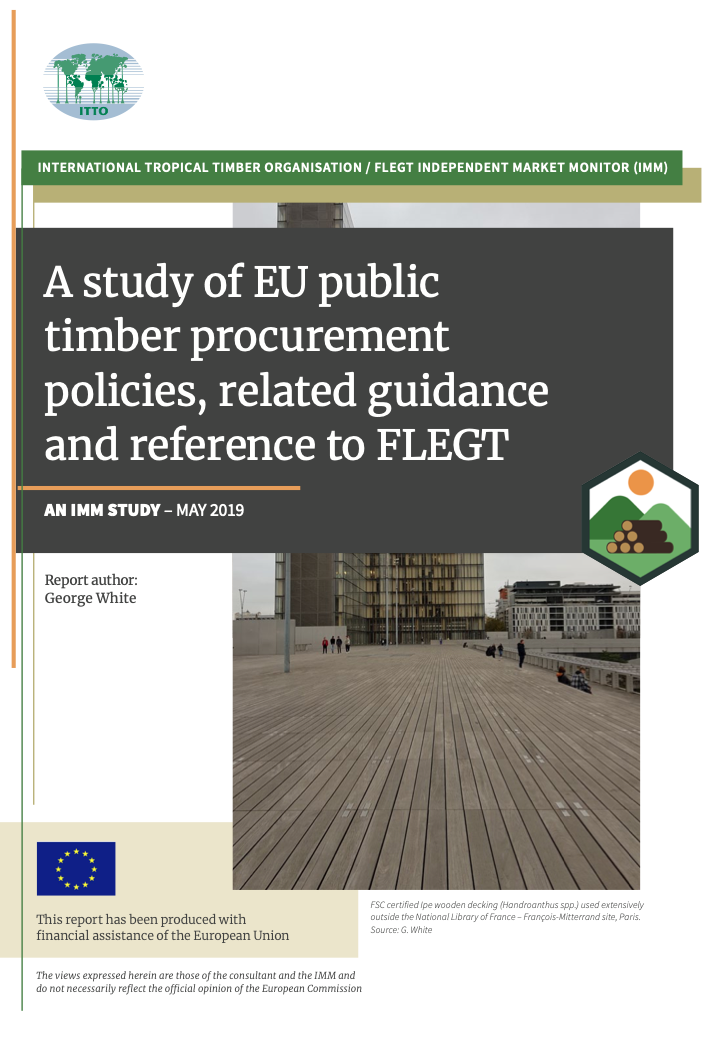A study of EU public timber procurement policies, related guidance and reference to FLEGT
DOWNLOADS
CATEGORY
Special Study
PUBLISHED DATE
May 2019
AUTHORS
George White
EDITORS
Sarah Storck, Rupert Oliver
DESCRIPTION
A study of EU public timber procurement policies, related guidance and reference to FLEGT
KEY FINDINGS
At least 20 EU member states now possess some form of public procurement policy for products containing or made from wood. Although they vary significantly in terms of their definition of criteria, coverage of products, applicability to different levels of government and whether they are voluntary or mandatory, they all aim to require, or at least encourage, government buyers to source legal, and often sustainable, timber.
Public procurement is perceived to play a significant role in the EU market place for forest products, though the exact contribution is hard to define. Many member states have invested greatly in setting policies through complex processes, with great consideration paid to policy content. Most EU member states have mandatory purchasing policies for central government departments and voluntary policies for local authorities and other agencies. The majority of public spending is undertaken at a local government level though and little monitoring of policy compliance has been directly observed. Most EU member state governments do not know how much wood they purchase and therefore have no indication of how much sustainable, legal or FLEGT-Licensed material might be included within their procurement.
The interviews conducted for this study focused on a small number of questions, which were developed to allow a range of individuals in different countries and with different responsibilities to comment. The primary purpose of the interviews was to gather together perceptions of FLEGT Licensing in the context of public procurement. The modest sample of views indicates that government procurement policy is quite well understood, valued as important to the wider market and influential in the private sector.
An almost universal feeling from those involved in business, as a trader or representing a trade association, was that there is little or no monitoring of compliance within government agencies. The majority of those interviewed felt that in effect many of the procurement officers within government have little knowledge about how tropical wood is produced but that they do have the same negative prejudices that many in society carry. This leads to tropical wood perhaps facing more scrutiny that other wood-based materials. The interviews revealed a broad consensus that procurement officers do not have a clear understanding of what FLEGT Licensing is or what it represents and do not have knowledge of the wider Voluntary Partnership Agreement (VPA) process and its beneficial impacts.
Like forest certification, FLEGT Licensing faces the challenge of communicating the benefits it brings across a range of countries, forest types and political frameworks.
The study recommends:
- Communication of the results of independent reviews of the performance of the systems underlying FLEGT Licences.
- Researching, consulting widely and then clarifying and communicating the status of FLEGT Licensing compared to third party certification
- Support for the efforts of the FLEGT counties, especially those with functional timber legality assurance systems (TLAS) systems, to promote the benefits and positive impacts of these systems.
- Active engagement of civil society organisations and private sector organisations seeking to influence public sector procurement policies.
- Speeding up the introduction of FLEGT-Licensed timber supplies from other VPA countries.

